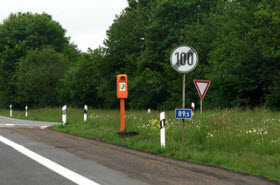 As part of strict new safety regulations designed to decrease traffic accidents and fatalities, European Union officials want new cars to include technology that automatically prevents them from going over the speed limit.
As part of strict new safety regulations designed to decrease traffic accidents and fatalities, European Union officials want new cars to include technology that automatically prevents them from going over the speed limit.
According to British newspaper the Daily Mail, existing vehicles could also be equipped with the technology so that that no car "would be allowed to travel faster than 70 mph."
Under the new measure, all new cars in the EU would use camera systems to “read” speed limits displayed on road signs and automatically apply the brakes to slow the car if it exceeds posted speeds. BMW and Mercedes vehicles already have traffic-sign recognition, although it’s used to warn drivers, not automatically slow them down.
Britain’s top transportation official, reacting the same as most drivers, said that the proposed measure smacks of Big Brother meddling and that he plans to block it. According to the Daily Mail, Transport Secretary Patrick McLoughlin “erupted” when he learned of the proposed regulation.
The European Commission Mobility and Transport Department’s Intelligent Speed Adaptation (ISA) system is part of a road safety program that hopes to reduce the death toll from traffic accidents in the EU by a third by 2020. Of the more than 30,000 people who die on European roads, experts estimate that 6,000 of those deaths could be prevented if drivers followed speed limits. A commission spokesman noted that the technology is already used on trucks and buses in the EU.
The ISA technology works either by using cameras to read road signs or satellites to communicate speed limits to cars. If a driver is detected going over the speed limit, the system can employ three separate controls to slow the car. First, an “advice” mode notifies drivers that they’ve exceeded the speed limit by sounding a warning. Second, a “driver select” option slows the car but also gives the driver the option to override the system. Third, a “mandatory" mode doesn’t let a driver go over the speed limit under any circumstances.
McLoughlin noted that his country has one of the best road-safety records in Europe and that U.K. road deaths declined from 1,901 in 2011 to 1,754 in 2012 – "the lowest figure since records began in 1926," according to the Daily Mail. France and Germany both recorded more than twice as many deaths last year.
The Daily Mail reported that McLoughlin has been asked by the European Commission for his views before the formal proposals are published this fall, and EC officials also noted that more new vehicles are coming equipped with camera and satellite technology, making it “cheap and easy” to add the speed-control system.
The newspaper reported that a government source said McLouglin has asked officials to block the regulations because they are a violation of British drivers’ freedom. The source added, “This has Big Brother written all over it and is exactly the sort of thing that gets people’s backs up about [the EU]. We are about getting a better deal for Britain, not letting EU bureaucrats encroach further into people’s lives."
A spokesman for the U.K.’s Automobile Association told the Daily Mail that although the technology is designed to prevent accidents, it could create its own hazards. “If you were overtaking a tractor and suddenly needed to accelerate to avoid a head-on collision, you would not be able to,” the spokesman said, adding that he said he would support a system that uses audible speed alerts.
With super-fast supercars available in Germany and Italy, where there are no speed limits on parts of the autobahn and autostrada, it’s difficult to fathom that the regulation will not come under more criticism in other parts of the EU. Even in the U.S., most new cars can go from zero to 60 in just a few seconds and cruise easily at 75 mph, if not much higher.
[Source: The Daily Mail]
Source: MSN
No comments:
Post a Comment